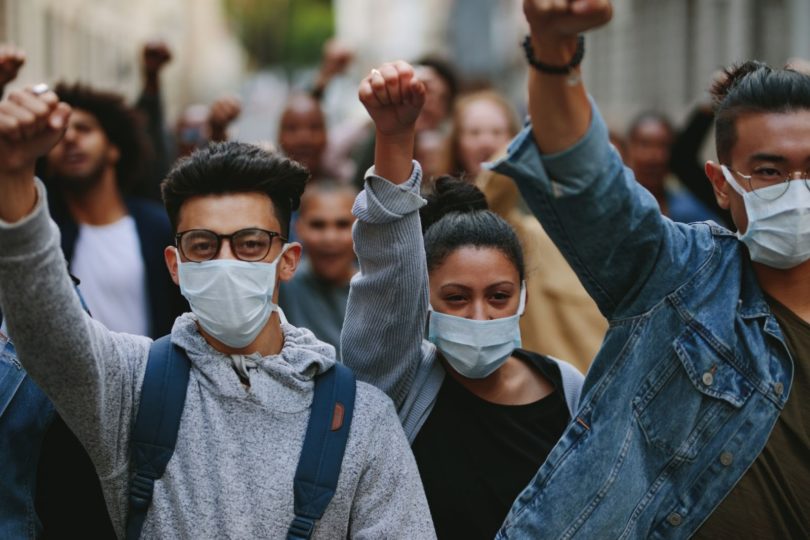Resources from Stop AAPI Hate for Asian American and Pacific Islander Heritage Month
Manjusha P. Kulkarni (“Manju”, she/her) is the Executive Director of the Asian Pacific Policy and Planning Council (A3PCON), a coalition of 40+ community-based organizations that serves and represents all 1.5 million Asian Americans and Pacific Islanders in Los Angeles County. A 2014 recipient of the White House Champions for Change award, she is also a lecturer in the Asian American Studies Department at UCLA. In 2020, Manju and her team at A3PCON joined Chinese for Affirmative Action and San Francisco State University in co-founding Stop AAPI Hate. Recently, Stop AAPI Hate was honored with the Webby Award for Social Movement of the Year. Born in India and raised in Montgomery, Alabama to Indian immigrants, she resides in Los Angeles with her husband and two daughters.
“CHINA VIRUS.” A few months ago, Eric, my Japanese American neighbor, told me that he saw these words scrawled in big white letters across the sidewalk a few blocks from our street.
Hearing this stung. He and his family have been in our Southern California neighborhood since 1982 and my husband, kids and I have lived here for almost 19 years.
Given the work I do, I should not have been surprised. In March 2020, I co-founded Stop AAPI Hate with my colleagues Cynthia Choi of Chinese for Affirmative Action and Russell Jeung of San Francisco State University. We created the online reporting center to track hate incidents directed at our Asian American and Pacific Islander (AAPI) community members at the start of the pandemic. Sadly, within a few weeks, several hundred individuals from across the country reported hate incidents they had experienced. And, as the nation’s leading aggregator of anti-AAPI hate incidents, we received over 6,600 between March 19, 2020 and March 31, 2021.
All of the incidents are stories of suffering, of racism, of feelings of otherness. They include reports of verbal harassment, workplace discrimination, refusal of service at a retail store, and sometimes physical attacks. Among some of the most heart wrenching are the ones of Asian Americans and Pacific Islanders hearing racist epithets shouted at them by their longtime neighbors—people whom they thought were their friends, individuals whom they thought they could rely upon to provide a needed egg for pancakes, to hold mail while they went on vacation, to look for oncoming cars when their kids were riding bikes in the street. Instead, AAPIs across our nation are like Eric and I, wondering how and why we are being targeted in the places we call home.
Unfortunately, this hate — and at times, violence— is nothing new. And, in so many cases in our history, it involved structural, government-sanctioned discrimination against not only Asian Americans, but also Black and Latinx neighbors. Reviewing the deed on our home the other day — located in the diverse and progressive city of Los Angeles —I found that the document from September 1949 included a racially restrictive covenant. Specifically, it stated:
No part of said property shall be used or occupied or permitted
to be occupied by any person not of the White or Caucasian race,
except such persons as are engaged in the bona fide domestic
employment of the owner thereof, or of those holding under said owner.
This meant that my grandparents could not have purchased the home nor lived in it. Neither could my parents. Not unless they were “the help.” At least not until 1968, one year before I was born, when passage of the Fair Housing Act made such covenants illegal.
Fifty-three years later, we have an opportunity to state clearly that we find the racism of the past unacceptable. And we have a chance to fight the hate of today — in our neighborhoods and communities, places that we choose to live, to grow our gardens and raise our children. Each and every one of us can take action now:
- If you experience an act of anti-Asian hate or discrimination or witness such an act, report it to www.stopaapihate.org. In addition to collecting data, we at Stop AAPI Hate provide resources and assistance to community members through local networks and advocate for policies to address racism.
- If you see an act of hate, whether it be a racist joke online, a derogatory comment by a friend, or a refusal of service, say something. Indicate that such behavior is unacceptable to you. Speak with a manager in a store or restaurant if you witness others experiencing discrimination.
- Donate your time and energy to causes that bring members of your community together, whether it be through your neighborhood school, a local food pantry or a civic organization.
- Demand that your city council pass a resolution condemning hate and that your school and school district train teachers in how to deal with bias-based bullying and create protocols to address hate incidents when they occur in schools.
- And show your support for your neighbors and friends. Ask them about their recent experiences and offer help. Listen when they tell you about their struggles and uplift their stories. Take action with them in ways they are comfortable with.
A few weeks after Eric told me about the racist graffiti on the sidewalk, I happened to catch a sign wrapped around a tree on a nearby street that said, “Stop Asian Hate.” It made me tear up as I jogged past it. It did not erase the pain of the hateful graffiti, but it did indicate that some of the folks in my neighborhood cared about families like mine and showed their support for us. The sign gave me hope — hope that if neighbors, co-workers and friends join us in the fight, racism might truly be a relic of the past. And it made me believe that if we work together for meaningful change in our neighborhoods, in our classrooms, at our city halls and the halls of Congress, we can actually Stop AAPI Hate.
Here are additional resources from Nextdoor to learn more and take action:
- Neighborhood-centered solutions to anti-Asian violence and racism
- Nextdoor’s stance against anti-Asian hate
- Nextdoor’s anti-racism hub with educational resources
- Nextdoor’s policy to prevent racism & discrimination
To connect with your local neighborhood, please login at nextdoor.com.


